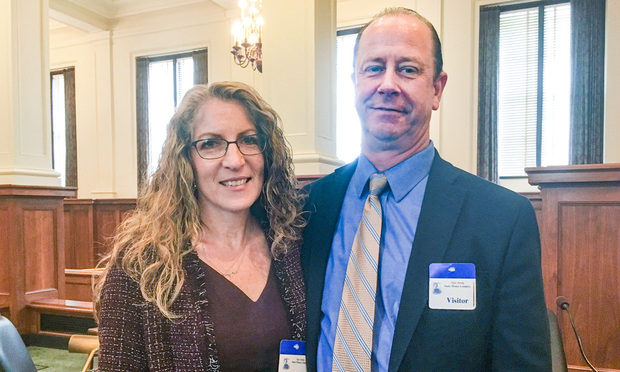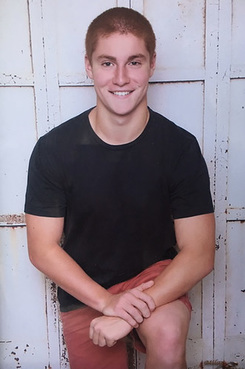Anti-Hazing Bill Spurred by Penn State Student's Death Passes NJ Senate Committee
It would upgrade each grade of hazing to a felony, and clarifies prohibited conduct to include causing, coercing or forcing consumption of alcohol or drugs.
September 10, 2019 at 06:17 PM
5 minute read
After they lost their son to a hazing incident at Penn State University in 2017, Evelyn and Jim Piazza are determined to make hazing a felony, one state legislature at a time, and now New Jersey lawmakers are considering such measures.
On Tuesday, S-3150, known as "Timothy J. Piazza's Law" passed the New Jersey Senate Judiciary Committee and now heads to the full Senate for a vote. It would upgrade each grade of hazing to a felony, and clarifies prohibited conduct to include causing, coercing or forcing consumption of alcohol or drugs.
"The hazing law is a necessary thing," Jim Piazza, 58, testified before the committee on Tuesday, seated next to his wife, Evelyn, 51. "Hazing is occurring way too often in colleges, high schools and middle schools and people are dying."
 Evelyn and Jim Piazza, whose son died in a hazing incident at Penn State University in February 2017, testified in Trenton on Sept. 10, 2019, on a bill seeking to combat hazing. Photo by Suzette Parmley/ALM
Evelyn and Jim Piazza, whose son died in a hazing incident at Penn State University in February 2017, testified in Trenton on Sept. 10, 2019, on a bill seeking to combat hazing. Photo by Suzette Parmley/ALMThe bill passed by a 8-0 vote, with Sens. Nicholas Scutari, D-Union, Nellie Pou, D-Passaic, Joseph Lagana, D-Bergen, Teresa Ruiz, D-Essex (sitting in place of Sen. Paul Sarlo), Linda Greenstein, D-Middlesex (in place of Sen. Bob Smith), Christopher "Kip" Bateman, R-Somerset, Gerald Cardinale, R-Bergen, and Michael Doherty, R-Warren, voting in favor.
Sen. Troy Singleton, D-Burlington, was absent from the hearing and did not vote since he was chairing another committee hearing across the Annex.
Singleton has a separate bill, S-3628, which calls for adopting anti-hazing policies at colleges, high schools and middle schools, and expands the activities encompassing criminal hazing. That measure was also scheduled for a vote Tuesday by the Senate Judiciary Committee, but it was held by Scutari, the committee chairman, for a future hearing because of its broader reach and definition of hazing compared with S-3150.
S-3150 would increase hazing to a crime of the fourth degree, and aggravated hazing to a crime of the third degree. Currently, the charge reaches aggravated hazing when the criminal act results in serious bodily injury to another person.
 Timothy Piazza, who died in a hazing incident at Penn State University in 2017. Courtesy photo.
Timothy Piazza, who died in a hazing incident at Penn State University in 2017. Courtesy photo."We're trying to stiffen the penalties for hazing because we want to prevent the tragedy that happened at Penn State in 2017 to Tim," Bateman, the bill's prime sponsor, said to the Law Journal after the hearing. "He was a great athlete and a great student. It was irresponsible what happened at the frat house, and we need to have stronger penalties to deter this from happening again because it's happening all over the country."
An Assembly version of the bill (A-4728), sponsored by Assemblyman Louis Greenwald, D-Camden, Assemblywoman Carol Murphy, D-Burlington, Assemblyman Roy Freiman, D-Somerset, and Assemblyman John Armato, D-Atlantic, was referred to the Assembly Law and Public Safety Committee and has yet to be scheduled for a hearing.
The New Jersey legislation is essentially the same as one that passed the Pennsylvania Legislature last October and was signed by Pennsylvania Gov. Tom Wolf on Oct. 19, 2018.
In Pennsylvania it's known as the "Timothy J. Piazza Anti-Hazing Law," or "Tim's Law," after the Penn State sophomore from Readington who died during a fraternity hazing ritual at the on-campus Beta Theta Pi fraternity house in early 2017.
An investigation determined Piazza was pressured into consuming 18 alcohol drinks in 90 minutes on Feb. 2, 2017. He died two days later. Bateman said given the circumstances of his death, S-3150 prohibits causing, coercing, or forcing the consumption of alcohol or drugs.
"College students have the right to live and learn in a safe environment without fear, and parents who send their child off to school should demand no less," Bateman said in a statement following the hearing. "Unless we explicitly prohibit the deep-rooted custom of hazing, more families will suffer. It is my hope that this tragedy leads to real change."
Jim Piazza, who looked on with his wife as Wolf signed the bill in Harrisburg, said hazing events can escalate into life-threatening, and even fatal, ones such as his son's, because of the perfect storm of peer pressure and often alcohol or drug consumption.
"These are well-orchestrated and planned [events], and these people are taking other students' lives in their hands," he told the committee on Tuesday. "It's no different with people driving drunk. We strongly encourage the passage of this legislation to prevent hazing from happening."
Added Evelyn Piazza: "We want a deterrent so it doesn't happen in this state. The new law in Pennsylvania is a game changer. It's a deterrent."
The couple is planning a trip to Clemson University in South Carolina this Sunday and to the University of Florida on Monday to talk to students there about the dangers of hazing.
This content has been archived. It is available through our partners, LexisNexis® and Bloomberg Law.
To view this content, please continue to their sites.
Not a Lexis Subscriber?
Subscribe Now
Not a Bloomberg Law Subscriber?
Subscribe Now
NOT FOR REPRINT
© 2025 ALM Global, LLC, All Rights Reserved. Request academic re-use from www.copyright.com. All other uses, submit a request to [email protected]. For more information visit Asset & Logo Licensing.
You Might Like
View All
Appellate Division Tosses Challenge to Rutgers Board Members That Ensnared NJ Lawyer
5 minute read
Seton Hall Escapes COVID-19 Wrongful Death Suit After Student Found Dead in Dorm
4 minute read
Where CFPB Enforcement Stops Short on Curbing School Lunch Fees, Class Action Complaint Steps Up
5 minute read
From 'Confusing Labyrinth' to Speeding 'Roller Coaster': Uncertainty Reigns in Title IX as Litigators Await Second Trump Admin
6 minute readTrending Stories
- 1The Law Firm Disrupted: Scrutinizing the Elephant More Than the Mouse
- 2Inherent Diminished Value Damages Unavailable to 3rd-Party Claimants, Court Says
- 3Pa. Defense Firm Sued by Client Over Ex-Eagles Player's $43.5M Med Mal Win
- 4Losses Mount at Morris Manning, but Departing Ex-Chair Stays Bullish About His Old Firm's Future
- 5Zoom Faces Intellectual Property Suit Over AI-Based Augmented Video Conferencing
Who Got The Work
J. Brugh Lower of Gibbons has entered an appearance for industrial equipment supplier Devco Corporation in a pending trademark infringement lawsuit. The suit, accusing the defendant of selling knock-off Graco products, was filed Dec. 18 in New Jersey District Court by Rivkin Radler on behalf of Graco Inc. and Graco Minnesota. The case, assigned to U.S. District Judge Zahid N. Quraishi, is 3:24-cv-11294, Graco Inc. et al v. Devco Corporation.
Who Got The Work
Rebecca Maller-Stein and Kent A. Yalowitz of Arnold & Porter Kaye Scholer have entered their appearances for Hanaco Venture Capital and its executives, Lior Prosor and David Frankel, in a pending securities lawsuit. The action, filed on Dec. 24 in New York Southern District Court by Zell, Aron & Co. on behalf of Goldeneye Advisors, accuses the defendants of negligently and fraudulently managing the plaintiff's $1 million investment. The case, assigned to U.S. District Judge Vernon S. Broderick, is 1:24-cv-09918, Goldeneye Advisors, LLC v. Hanaco Venture Capital, Ltd. et al.
Who Got The Work
Attorneys from A&O Shearman has stepped in as defense counsel for Toronto-Dominion Bank and other defendants in a pending securities class action. The suit, filed Dec. 11 in New York Southern District Court by Bleichmar Fonti & Auld, accuses the defendants of concealing the bank's 'pervasive' deficiencies in regards to its compliance with the Bank Secrecy Act and the quality of its anti-money laundering controls. The case, assigned to U.S. District Judge Arun Subramanian, is 1:24-cv-09445, Gonzalez v. The Toronto-Dominion Bank et al.
Who Got The Work
Crown Castle International, a Pennsylvania company providing shared communications infrastructure, has turned to Luke D. Wolf of Gordon Rees Scully Mansukhani to fend off a pending breach-of-contract lawsuit. The court action, filed Nov. 25 in Michigan Eastern District Court by Hooper Hathaway PC on behalf of The Town Residences LLC, accuses Crown Castle of failing to transfer approximately $30,000 in utility payments from T-Mobile in breach of a roof-top lease and assignment agreement. The case, assigned to U.S. District Judge Susan K. Declercq, is 2:24-cv-13131, The Town Residences LLC v. T-Mobile US, Inc. et al.
Who Got The Work
Wilfred P. Coronato and Daniel M. Schwartz of McCarter & English have stepped in as defense counsel to Electrolux Home Products Inc. in a pending product liability lawsuit. The court action, filed Nov. 26 in New York Eastern District Court by Poulos Lopiccolo PC and Nagel Rice LLP on behalf of David Stern, alleges that the defendant's refrigerators’ drawers and shelving repeatedly break and fall apart within months after purchase. The case, assigned to U.S. District Judge Joan M. Azrack, is 2:24-cv-08204, Stern v. Electrolux Home Products, Inc.
Featured Firms
Law Offices of Gary Martin Hays & Associates, P.C.
(470) 294-1674
Law Offices of Mark E. Salomone
(857) 444-6468
Smith & Hassler
(713) 739-1250






